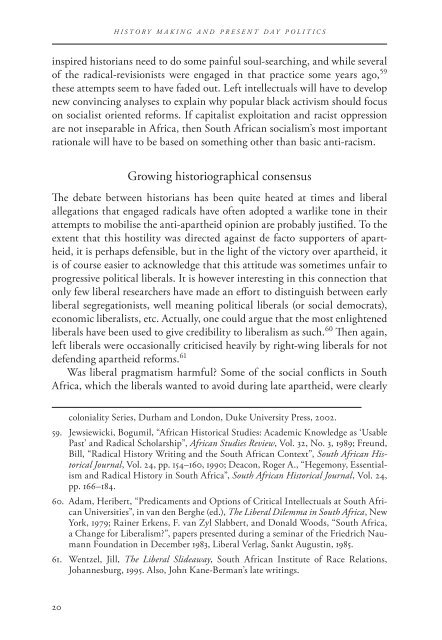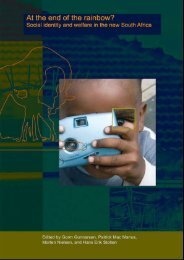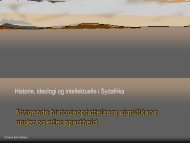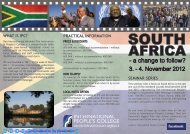History Making and Present Day Politics - Stolten's African Studies ...
History Making and Present Day Politics - Stolten's African Studies ...
History Making and Present Day Politics - Stolten's African Studies ...
You also want an ePaper? Increase the reach of your titles
YUMPU automatically turns print PDFs into web optimized ePapers that Google loves.
h i s t o r y m a k i n g a n d p r e s e n t d a y p o l i t i c s<br />
inspired historians need to do some painful soul-searching, <strong>and</strong> while several<br />
of the radical-revisionists were engaged in that practice some years ago, 59<br />
these attempts seem to have faded out. Left intellectuals will have to develop<br />
new convincing analyses to explain why popular black activism should focus<br />
on socialist oriented reforms. If capitalist exploitation <strong>and</strong> racist oppression<br />
are not inseparable in Africa, then South <strong>African</strong> socialism’s most important<br />
rationale will have to be based on something other than basic anti-racism.<br />
Growing historiographical consensus<br />
The debate between historians has been quite heated at times <strong>and</strong> liberal<br />
allegations that engaged radicals have often adopted a warlike tone in their<br />
attempts to mobilise the anti-apartheid opinion are probably justified. To the<br />
extent that this hostility was directed against de facto supporters of apartheid,<br />
it is perhaps defensible, but in the light of the victory over apartheid, it<br />
is of course easier to acknowledge that this attitude was sometimes unfair to<br />
progressive political liberals. It is however interesting in this connection that<br />
only few liberal researchers have made an effort to distinguish between early<br />
liberal segregationists, well meaning political liberals (or social democrats),<br />
economic liberalists, etc. Actually, one could argue that the most enlightened<br />
liberals have been used to give credibility to liberalism as such. 60 Then again,<br />
left liberals were occasionally criticised heavily by right-wing liberals for not<br />
defending apartheid reforms. 61<br />
Was liberal pragmatism harmful? Some of the social conflicts in South<br />
Africa, which the liberals wanted to avoid during late apartheid, were clearly<br />
coloniality Series, Durham <strong>and</strong> London, Duke University Press, 2002.<br />
59. Jewsiewicki, Bogumil, “<strong>African</strong> Historical <strong>Studies</strong>: Academic Knowledge as ‘Usable<br />
Past’ <strong>and</strong> Radical Scholarship”, <strong>African</strong> <strong>Studies</strong> Review, Vol. 32, No. 3, 1989; Freund,<br />
Bill, “Radical <strong>History</strong> Writing <strong>and</strong> the South <strong>African</strong> Context”, South <strong>African</strong> Historical<br />
Journal, Vol. 24, pp. 154–160, 1990; Deacon, Roger A., “Hegemony, Essentialism<br />
<strong>and</strong> Radical <strong>History</strong> in South Africa”, South <strong>African</strong> Historical Journal, Vol. 24,<br />
pp. 166–184.<br />
60. Adam, Heribert, “Predicaments <strong>and</strong> Options of Critical Intellectuals at South <strong>African</strong><br />
Universities”, in van den Berghe (ed.), The Liberal Dilemma in South Africa, New<br />
York, 1979; Rainer Erkens, F. van Zyl Slabbert, <strong>and</strong> Donald Woods, “South Africa,<br />
a Change for Liberalism?”, papers presented during a seminar of the Friedrich Naumann<br />
Foundation in December 1983, Liberal Verlag, Sankt Augustin, 1985.<br />
61. Wentzel, Jill, The Liberal Slideaway, South <strong>African</strong> Institute of Race Relations,<br />
Johannesburg, 1995. Also, John Kane-Berman’s late writings.<br />
20









